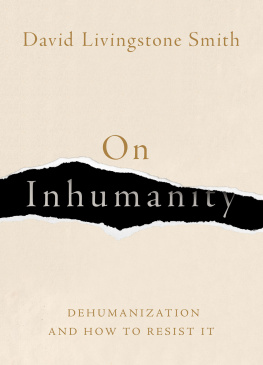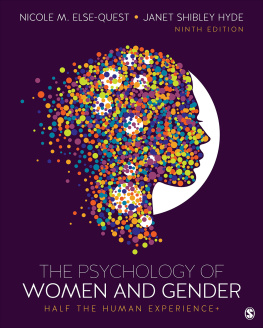Humanness and Dehumanization
What does it mean to be human? Why do people dehumanize others (and sometimes themselves)? These questions have only recently begun to be investigated in earnest within psychology. This volume presents the latest thinking about these and related questions from research leaders in the field of humanness and dehumanization in social psychology and related disciplines. Contributions provide new insights into the history of dehumanization and its different types, and new theories are proposed for when and why dehumanization occurs. While peoples views about what humanness is, and who has it, have long been known as important in understanding ethnic conflict, contributors demonstrate its relevance in other domains, including medical practice, policing, gender relations, and our relationship with the natural environment. Cultural differences and similarities in beliefs about humanness are explored, along with strategies to overcome dehumanization.
In highlighting emerging ideas and theoretical perspectives, describing current theoretical issues and controversies and ways to resolve them, and extending research to new areas, this volume will influence research on humanness and dehumanization for many years.
Paul G. Bain is Research Fellow in the Humanities and Social Sciences at the University of Queensland, Australia. His research focuses on conceptions and attributions of humanness (including dehumanization) and folk beliefs about the future of society. His research has been published in the top social psychology journals, including the Journal of Personality and Social Psychology and Personality and Social Psychology Bulletin, as well as top specialist journals such as Nature Climate Change.
Jeroen Vaes is Assistant Professor at the University of Padova, Italy. His research focuses on humanness as a dimension of social judgment in intergroup relations and in the realm of sexual and medical objectification. He has published research articles and chapters in the most important international outlets of social psychology. Currently, he is an associate editor of the British Journal of Social Psychology and has received the Jos Jaspars award from the European Association of Social Psychology for early career scientific achievements.
Jacques-Philippe Leyens is Professor Emeritus at the Catholic University of Louvain at Louvain-la-Neuve, Belgium. He has initiated several lines of research in social perception, intergroup relations, and racism. Chief editor of the European Journal of Social Psychology, he has been president of the European Association of Social Psychology and received the Tajfel award for his work and contribution to the development of social psychology in Europe. He was also an associate editor of the Journal of Personality and Social Psychology-Interpersonal Relations and Group Processes.
Humanness and Dehumanization
Edited by Paul G. Bain, Jeroen Vaes, and Jacques-Philippe Leyens

First published 2014
by Psychology Press
711 Third Avenue, New York, NY 10017
Simultaneously published in the UK
by Psychology Press
27 Church Road, Hove, East Sussex BN3 2FA
Psychology Press is an imprint of the Taylor & Francis Group, an informa business
2014 Taylor & Francis
The right of the editors to be identified as the authors of the editorial material, and of the authors for their individual chapters, has been asserted in accordance with sections 77 and 78 of the Copyright, Designs and Patents Act 1988.
All rights reserved. No part of this book may be reprinted or reproduced or utilised in any form or by any electronic, mechanical, or other means, now known or hereafter invented, including photocopying and recording, or in any information storage or retrieval system, without permission in writing from the publishers.
Trademark Notice: Product or corporate names may be trademarks or registered trademarks, and are used only for identification and explanation without intent to infringe.
Library of Congress Cataloging-in-Publication Data
Humanness and dehumanization / edited by Paul G. Bain, Jeroen Vaes, and Jacques-Philippe Leyens.
pages cm
1. Respect for persons. 2. Dignity. I. Bain, Paul G., editor of compilation.
BJ1533.R42H825 2013
179dc23
2013016485
ISBN: 978-1-84872-610-9 (hbk)
ISBN: 978-1-84872-690-1 (pbk)
ISBN: 978-0-203-11053-9 (ebk)
Typeset in Sabon
by Apex CoVantage, LLC
Contents
PAUL G. BAIN, JEROEN VAES, AND JACQUES-PHILIPPE LEYENS
PART 1
Historical and Theoretical Insights Into Dehumanization
GUSTAV JAHODA
NICK HASLAM
ADAM WAYTZ, JULIANA SCHROEDER, AND NICHOLAS EPLEY
VICTORIA K. LEE AND LASANA T. HARRIS
GORDON HODSON, CARA C. MACINNIS, AND KIMBERLY COSTELLO
NATHAN A. HEFLICK AND JAMIE L. GOLDENBERG
PART 2
DehumanizationSpecific Targets and Fields of Occurrence
MILICA VASILJEVIC AND G. TENDAYI VIKI
REBECCA C. HETEY AND JENNIFER L. EBERHARDT
JACQUES-PHILIPPE LEYENS
JEROEN VAES, STEVE LOUGHNAN, AND ELISA PUVIA
BROCK BASTIAN, JOLANDA JETTEN, AND NICK HASLAM
PART 3
Exploring and Extending Ideas About Humanity
PAUL G. BAIN
MIROSAW KOFTA, TOMASZ BARAN, AND MONIKA TARNOWSKA
JILLIAN K. SWENCIONIS AND SUSAN T. FISKE
YOSHIHISA KASHIMA AND ELISE MARGETTS
PART 4
Conclusion
JEROEN VAES, PAUL G. BAIN, AND JACQUES-PHILIPPE LEYENS
Adam Waytz, Kellogg School of Management, Northwestern University, Chicago, Illinois, USA
Brock Bastian, School of Psychology, University of Queensland, Brisbane, Australia
Cara C. MacInnis, Department of Psychology, Brock University, St. Catharines, Canada
Elisa Puvia, School of Psychology, University of Kent, Canterbury, UK
Elise Margetts, School of Psychological Sciences, University of Melbourne, Melbourne, Australia
G. Tendayi Viki, School of Psychology, University of Kent, Canterbury, UK
Gordon Hodson, Department of Psychology, Brock University, St. Catharines, Canada
Gustav Jahoda, School of Psychological Sciences and Health, University of Strathclyde, Glasgow, UK
Jacques-Philippe Leyens, Faculty of Psychology and Educational Sciences, Catholic University of Louvain at Louvain-la-Neuve, Belgium
Jamie L. Goldenberg, Department of Psychology, University of South Florida, Tampa, Florida, USA
Jennifer L. Eberhardt, Department of Psychology, Stanford University, Stanford, California, USA
Jeroen Vaes, Department of Developmental Psychology and Socialization, University of Padova, Padova, Italy
Jillian K. Swencionis, Department of Psychology, Princeton University, Princeton, New Jersey, USA
Jolanda Jetten, School of Psychology, University of Queensland, Brisbane, Australia
Juliana Schroeder, Booth School of Business, University of Chicago, Chicago, Illinois, USA
Kimberly Costello, Department of Psychology, Brock University, St. Catharines, Canada
Lasana T. Harris, Department of Psychology and Neuroscience, Duke University, Durham, North Carolina, USA
Milica Vasiljevic, School of Psychology, University of Kent, Canterbury, UK
Mirosaw Kofta, Faculty of Psychology, University of Warsaw, Warsaw, Poland
Monika Tarnowska, Warsaw School of Social Sciences and Humanities, Warsaw, Poland
Nathan A. Heflick, School of Psychology, University of Kent, Canterbury, UK
Nicholas Epley, Booth School of Business, University of Chicago, Chicago, Illinois, USA
Next page




